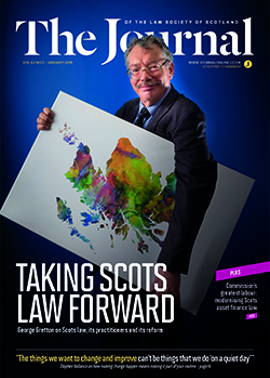Legally habit-forming

I suspect there are two types of people reading this article. Both will have set themselves a new year’s resolution but only one type will have stuck to it.
What does that have to do with running a legal business? Well, like so many things in life it is all about mindsets and behaviours. The same issues that prevent us from losing weight or getting fit also prevent us from making the changes to our businesses that we know we should. If we can address these issues then not only can we be slimmer and fitter, we can have better businesses too.
Let me start with a story that I hope sums up at least one of the issues. When I ran my own practice I used to leave the house every morning around 6am. It let me beat the traffic into Glasgow, and rather than wasting an hour in a tailback I could speed into the city along empty roads and spend that hour in the gym. For almost 12 years I did that religiously, to the extent that missing my gym time would upset me. There were plenty of days that I didn’t want to go, but I always did: sitting for an extra hour on the M77 was even less appealing, and after each session I always felt better for it.
Wind forward 12 years to when I sold my business and had more time. What happened? My routine changed. I didn’t need to beat the traffic and my gym time could be any time, but it wasn’t. It became less and less frequent because what held me to it was the routine: 7 til 8am was when I trained, and once that routine was broken, and without another to replace it, other things simply ate up my day and I started putting training off until “tomorrow”. I made time to train even when at my busiest in my professional life, yet without the routine I struggled to replicate this when time was no longer an issue. This is something I have seen over and over again. Those who build routines and habits into their days seem to have time for it all; those who don’t often seem to have no time at all.
Turning change into routine
That analogy I hope is a good starting place for our businesses. The things we want to change and improve can’t be things that we do “on a quiet day”. These days don’t exist, and even if they did, other more appealing things will nudge business development aside. What we need is to create a routine, some time boxed off and sacrosanct every week for these tasks. Just like going to the gym, it isn’t something we will always want to do, but it is something we know we need to do, and we and our businesses will be the better for it.
If it is that easy, why do so many of us struggle to keep to our resolutions? Well, these good habits take time to establish. Depending on the books you read, anything from 28 repetitions and beyond are required to bring about lasting change. You need to do that new thing at least 28 times until it becomes your norm. Like my early morning gym, after a while it just becomes routine. I didn’t wonder, “Will I go to the gym tomorrow”, or “What will I do there?” It was a given that I would be there and that I would use the time wisely (and often enjoyably). The same should apply to business development time. It shouldn’t be an “if”, an option when there is nothing else to do, or worse, something you look at only when a real emergency hits. It also shouldn’t be looked at as a chore, but instead as something worthwhile and enjoyable.
Beware the short-term view
For those of you who agree but struggle to establish these routines – I know, I’ve also been there. Other things seem to just keep bumping “it” out of the diary. “If only things would quieten down, I could get ahead of the game,” I’d often hear myself say. That, I’m afraid, just doesn’t work. What you are actually doing is making a choice. You are deciding that a short-term fix is better than a long-term solution; that the old habit is better than the new; that the chocolate biscuit is better than the fitter, slimmer you. I often compare this to driving a car with the engine making a strange noise. Do you keep driving it until finally it breaks down, or do you take time out and investigate before it becomes a real problem? Building time to work on your business is a choice, an important one, and needs to be prioritised in the same way as you do with settlement dates or induciae.
So why can’t we just commit to those 28 or so repetitions? That, I suspect, is the nub of things. Our mindsets, our belief systems are what often hold us back. Another analogy: as a child, I was always told by my father, as his father had told him, “Finish what is on your plate,” a mindset born in post-war Britain where food shortages and rationing were the issue. It doesn’t belong today, where obesity is more problematic. In fact, it is potentially dangerous. I know that finishing what is on my plate may not be good for me, yet when I am busy or stressed, or just let my guard down, I tend to default back to that old and deeply ingrained mindset. Likewise in business, how often have we decided that things need to change but after a short time fall back into our old ways? If we look at these old ways, are they even fit for purpose? Do all of them still belong in a modern legal practice? That is probably an article in itself, but I suspect we would all benefit from examining from time to time why we do things and asking whether it is still best practice.
Support strategies
How do we move past these roadblocks, either personally or in business? How do we start to change mindsets and behaviours? A couple of things I find work well.
First, have a clear picture of where you want to get to and why. In dieting, the “what” is easy, a target weight or waist size. The “why” is usually more personal, although I have noted most of my friends are a lot thinner after a breakup. In business it can be more difficult, although I suspect at times far more important. Try to have a clear vision of what your new business will look like and what you hope to gain by these changes. Write these down as clearly as you can, so you will know what you are trying to achieve. On personal matters like dieting or getting fit, it can be as easy as putting a picture of what you want on your fridge door, an ideal place to remind me that I don’t need that slice of cake. Are there pictures that perhaps represent where you want your business to be? In my experience deciding what we really want, really seeing it, is often harder than getting there.
Secondly, find someone else, perhaps several people, to hold you accountable to these goals. The easiest person to fool is so often ourself. Your internal voices will persuade you that you are too busy for business development today, or in my case that an extra chocolate biscuit can’t hurt. But it can; it’s what stops you building the good routines, or worse, starts you back on the path to bad ones. Other people will keep you honest. It might be your business partners, but it can be anyone you trust and whose opinion matters to you. I often embarrass myself into success. If I make a public enough announcement about what I am going to do, such as a Facebook announcement that I am losing weight or running a marathon, I leave myself with little option but to do it. A public announcement of business goals might not always be wise, but ask yourself, who do you trust and who will you give authority to keep you honest to them?
Thirdly, learn that not every setback is an end; not every diet need start on a Monday. The path to success in anything is not linear, and often the very hardest part is getting started. We all have off days, but if we treat each lapse as an end then no wonder most of us have failed in our new year’s resolution by now. The mindset has to be that a lapse is just a lapse and tomorrow we are back on track. Be wary of that voice that says let’s start again on Monday, or the first of the month. It is a bad idea! It’s just you choosing to default back to older, more comfortable habits. Start tomorrow, or at least start again tomorrow. Each time will be hard, but each time will be easier.
Lastly, learn to think like a scientist. Most spend their whole life experimenting, more often than not learning things that don’t work. With each failure they rejoice in having ruled out another option and having learned more useful information to make success more likely next time. Learn to approach life and business challenges with that same logic. See problems as an opportunity to learn rather than as a roadblock, and understand that getting it right first time is luck, but with perseverance, getting it right most of the time is guaranteed.
Business development, like personal development, is all about trial and error, finding out what works for you and your business. Listening to your own inner voices and working out which are yours and which belong to your past are an important part of it. Understand that we and our businesses are a certain way because of what we believe; the sum, if you like, of our mindsets and habits. If we want to change them, we have to change those beliefs and habits. If we do, success is guaranteed.
In this issue
- Valuing loss of society: an elusive consistency
- Child maintenance: yet another DWP effort
- Trading futures
- Appeals and extracts: sticking to the rules
- Making the law work better (1)
- Reading for pleasure
- Opinion: Trish McLellan
- Book reviews
- Profile
- President's column
- 2018: keep up the momentum
- People on the move
- "One lifetime is not enough"
- Legally habit-forming
- Equality in service
- The Scottish draft Budget 2018-19: what happened?
- Legal software: has your supplier been bought out?
- Asset finance: time for reform
- Human trafficking from the defence perspective
- Contract law in flux
- The limits of appeal
- Attention media lawyers
- Disability: a new focus
- A tale of two Budgets
- System redesign
- 21st Century Bar rides again
- Scottish Solicitors' Discipline Tribunal
- Happy new year?
- Specialist accreditation scheme relaunches
- Public policy highlights
- Paralegal pointers
- Making the law work better
- At the cutting EDGE
- Confirmation declarations agreed
- Q & A corner
- Documents, data and the GDPR
- Ask Ash
- Appreciation: Ethel May Houston OBE






